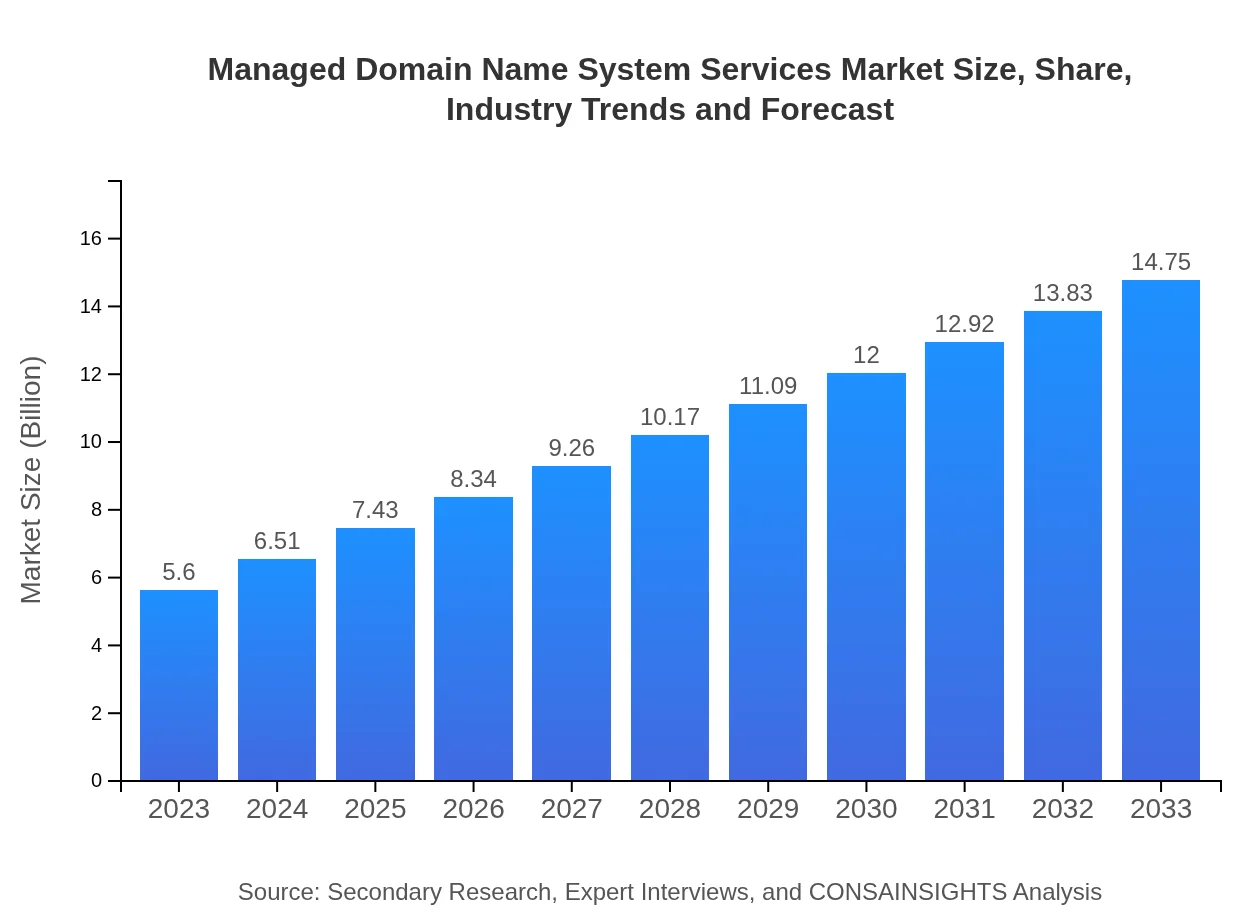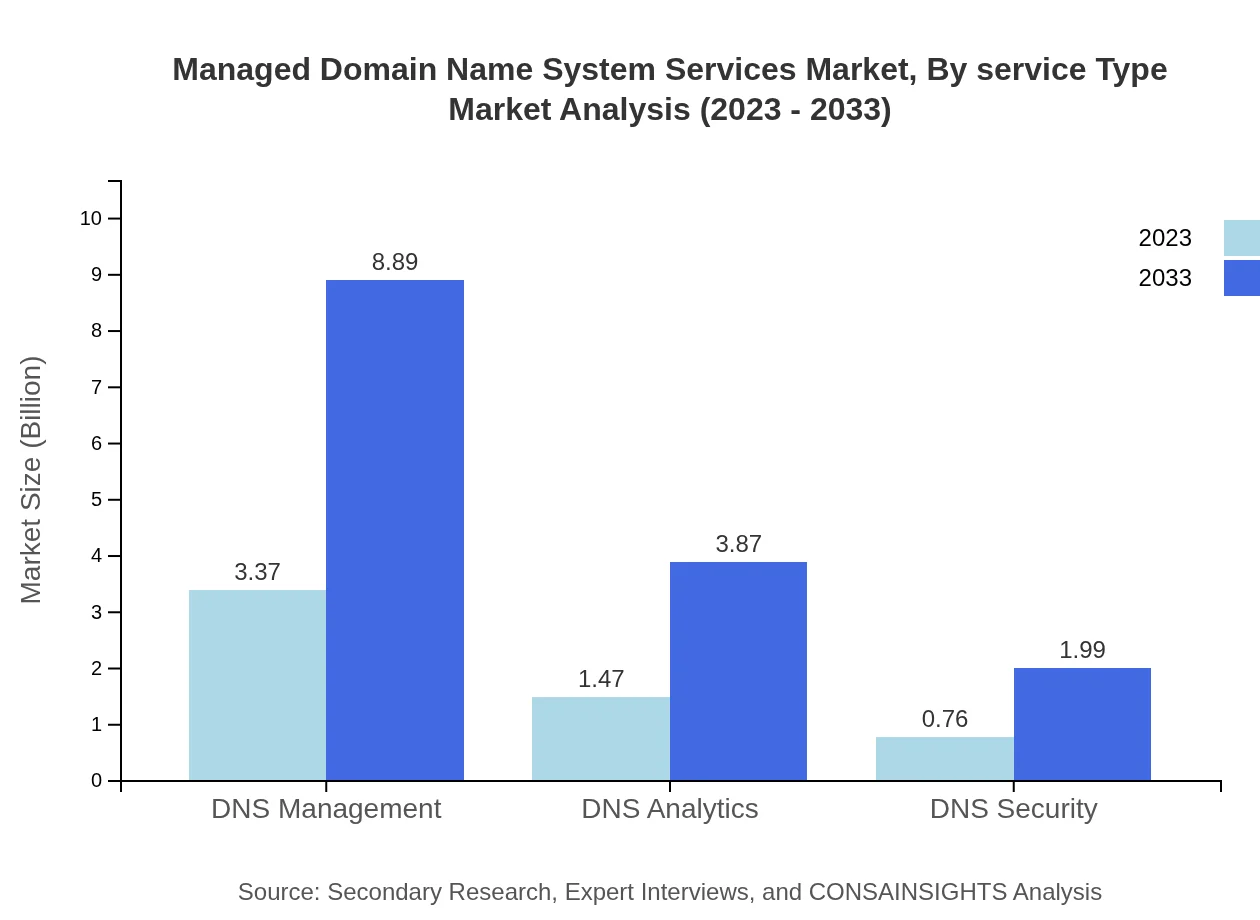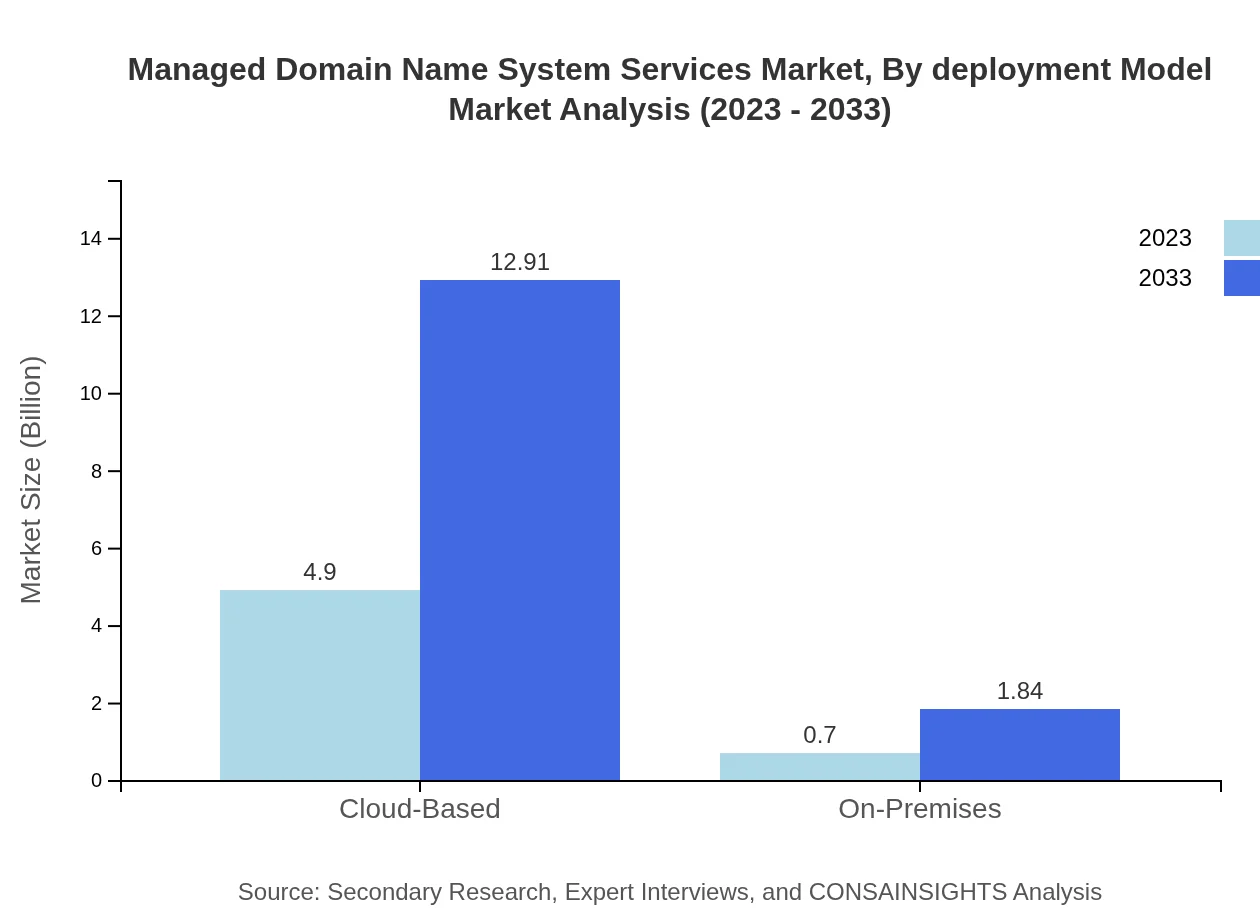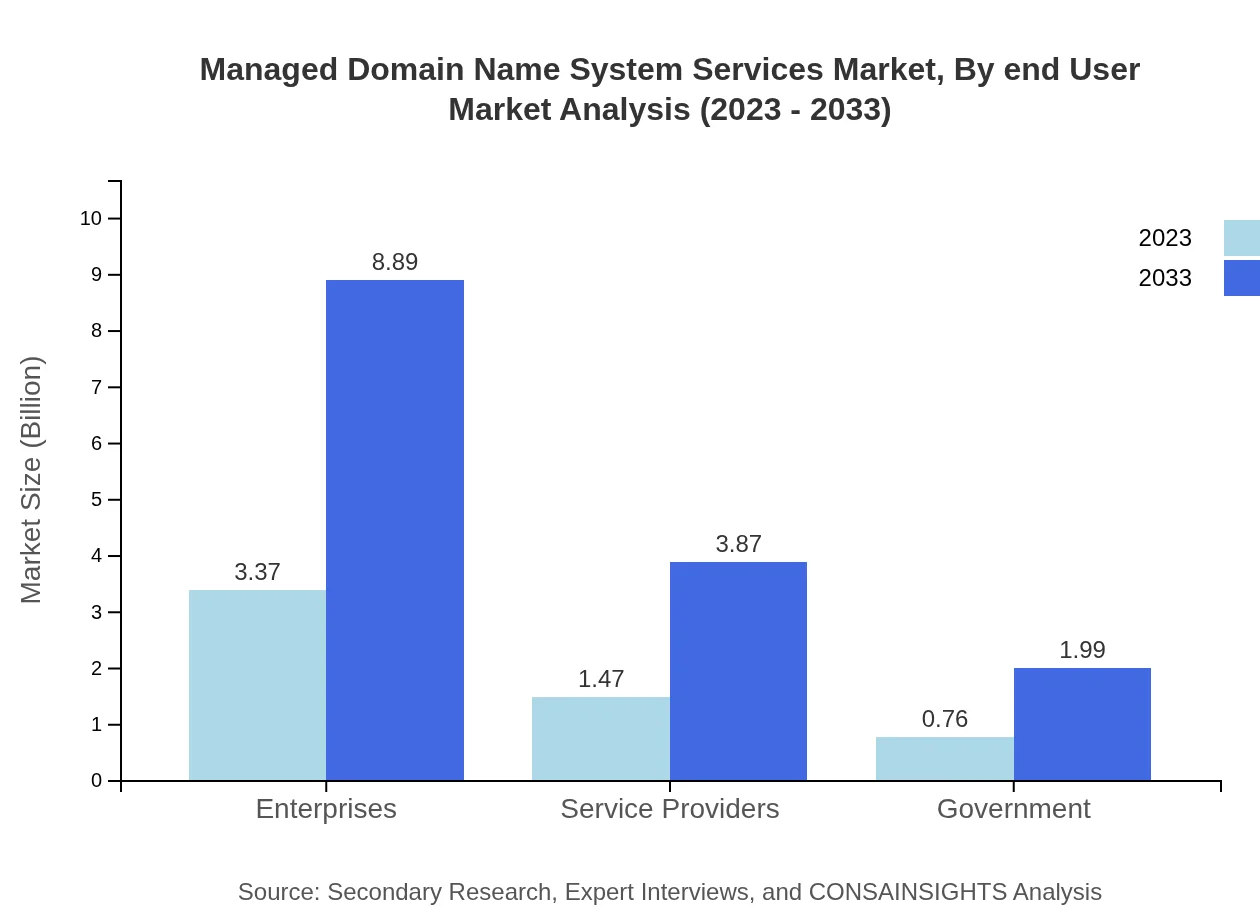Managed Domain Name System Services Market Report
Published Date: 31 January 2026 | Report Code: managed-domain-name-system-services
Managed Domain Name System Services Market Size, Share, Industry Trends and Forecast to 2033
This report provides a comprehensive analysis of the Managed Domain Name System Services market, highlighting market trends, size, segmentation, regional insights, and forecasts from 2023 to 2033. The report encapsulates critical data and insights to understand market dynamics and growth trajectories.
| Metric | Value |
|---|---|
| Study Period | 2023 - 2033 |
| 2023 Market Size | $5.60 Billion |
| CAGR (2023-2033) | 9.8% |
| 2033 Market Size | $14.75 Billion |
| Top Companies | Akamai Technologies, Cloudflare, GoDaddy, Amazon Web Services (AWS) |
| Last Modified Date | 31 January 2026 |
Managed Domain Name System Services Market Overview
Customize Managed Domain Name System Services Market Report market research report
- ✔ Get in-depth analysis of Managed Domain Name System Services market size, growth, and forecasts.
- ✔ Understand Managed Domain Name System Services's regional dynamics and industry-specific trends.
- ✔ Identify potential applications, end-user demand, and growth segments in Managed Domain Name System Services
What is the Market Size & CAGR of Managed Domain Name System Services market in 2033?
Managed Domain Name System Services Industry Analysis
Managed Domain Name System Services Market Segmentation and Scope
Tell us your focus area and get a customized research report.
Managed Domain Name System Services Market Analysis Report by Region
Europe Managed Domain Name System Services Market Report:
The European market is projected to grow from $1.78 billion in 2023 to $4.68 billion by 2033. Europe is focusing on regulatory compliance and data privacy, driving businesses to invest in managed DNS services, especially with GDPR considerations.Asia Pacific Managed Domain Name System Services Market Report:
In 2023, the Managed Domain Name System Services market in the Asia-Pacific region is estimated at $1.03 billion, projected to grow to $2.70 billion by 2033. The region's growth is driven by the rapid digitalization of businesses, increased internet penetration, and the need for efficient network infrastructure, especially in countries like India and China.North America Managed Domain Name System Services Market Report:
North America is a leader in the Managed Domain Name System Services market, with a value of $2.11 billion in 2023, anticipated to rise to $5.55 billion by 2033. The demand for advanced security features and the presence of major industry players contribute to strong growth in this region.South America Managed Domain Name System Services Market Report:
The South America region presents unique challenges, with the Managed Domain Name System Services market showing a slight decline, expected to reach -$0.12 billion by 2033. The slow adoption of cloud technologies and economic challenges are barriers to growth, though there are emerging opportunities as digital transformation initiatives progress.Middle East & Africa Managed Domain Name System Services Market Report:
The Middle East and Africa market is expected to grow from $0.74 billion in 2023 to $1.94 billion by 2033. The region's growing adoption of digital services and investments in technology infrastructure are contributing to this positive trend.Tell us your focus area and get a customized research report.
Managed Domain Name System Services Market Analysis By Service Type
The Managed Domain Name System Services market is driven by several key service types, including DNS management, DNS analytics, and DNS security. In 2023, the DNS management segment is valued at $3.37 billion, projected to grow to $8.89 billion by 2033, representing a substantial share of the overall market. DNS analytics and DNS security are also significant segments, valued at $1.47 billion and $0.76 billion in 2023 respectively, and expected to grow to $3.87 billion and $1.99 billion by 2033.
Managed Domain Name System Services Market Analysis By Deployment Model
The market is dominated by cloud-based deployment models, which accounted for a substantial size of $4.90 billion in 2023, expected to grow to $12.91 billion by 2033. Cloud-based services are favored for their flexibility and scalability, making them a preferred choice among enterprises. On-premises solutions are also prevalent, currently valued at $0.70 billion and growing to $1.84 billion by 2033.
Managed Domain Name System Services Market Analysis By End User
End-users of Managed DNS Services include enterprises, service providers, and government entities. The enterprise segment leads the market with a size of $3.37 billion in 2023, projected to reach $8.89 billion by 2033. Service providers contribute significantly with a market size of $1.47 billion expected to increase to $3.87 billion, while the government segment, currently at $0.76 billion, is expected to grow to $1.99 billion.
Managed Domain Name System Services Market Analysis By Region
Global Managed Domain Name System Services Market, By Region Market Analysis (2023 - 2033)
The Managed Domain Name System Services market showcases varied growth by region, with North America leading in size, followed by Europe and Asia-Pacific. North America is projected to grow from $2.11 billion to $5.55 billion, and Europe from $1.78 billion to $4.68 billion, utilizing cutting-edge technology and strong demand for security features. The Asia-Pacific market is also expected to grow rapidly, while South America faces unique challenges due to economic conditions.
Managed Domain Name System Services Market Trends and Future Forecast
Tell us your focus area and get a customized research report.
Global Market Leaders and Top Companies in Managed Domain Name System Services Industry
Akamai Technologies:
A leading provider of cloud services for delivering, optimizing, and securing online content, Akamai offers advanced Managed DNS services that enhance performance and security.Cloudflare:
Cloudflare provides a comprehensive suite of services including DNS management, security, and performance optimization, catering to businesses of all sizes globally.GoDaddy:
A renowned domain registrar and web hosting company, GoDaddy also offers managed DNS solutions that help businesses manage their online presence effectively.Amazon Web Services (AWS):
AWS delivers scalable and reliable managed DNS services through Amazon Route 53, which integrates seamlessly with many AWS services and infrastructure.We're grateful to work with incredible clients.









FAQs
What is the market size of managed Domain Name System Services?
The global managed domain name system services market is valued at approximately $5.6 billion with a CAGR of 9.8%. By 2033, significant growth is anticipated, reflecting the increasing demand for DNS management solutions worldwide.
What are the key market players or companies in this managed Domain Name System Services industry?
Key players in the managed domain name system services industry include companies like Akamai Technologies, Oracle Corporation, and Amazon Web Services. These organizations are pivotal in shaping the market through innovative service offerings and strategic expansions.
What are the primary factors driving the growth in the managed Domain Name System Services industry?
Growth is primarily driven by the rising demand for improved cybersecurity measures, the expansion of cloud computing, and the increasing importance of online presence for businesses. Additionally, regulatory compliance needs are pushing organizations to seek reliable DNS services.
Which region is the fastest Growing in the managed Domain Name System Services?
The fastest-growing region for managed domain name system services is North America, where market size is expected to rise from $2.11 billion in 2023 to $5.55 billion by 2033, indicating robust technology adoption and high internet penetration.
Does Consainsights provide customized market report data for the managed Domain Name System Services industry?
Yes, Consainsights offers customized market reports tailored to specific needs within the managed domain name system services industry, allowing clients to focus on areas of interest and gain detailed insights into market segments and trends.
What deliverables can I expect from this managed Domain Name System Services market research project?
Deliverables include comprehensive market analysis reports, segment data insights, trend assessments, competitive landscape evaluations, and forecasts that provide strategic guidance for decision-making in the managed domain name system services sector.
What are the market trends of managed Domain Name System Services?
Current trends include a shift towards cloud-based solutions, increased emphasis on DNS security, and a growing reliance on DNS analytics. These trends reflect the evolving needs of businesses to enhance performance and safeguard digital assets.




